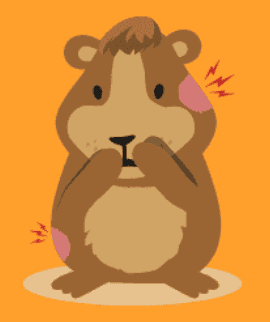Keeping your guinea pigs fit and healthy
Check if your guinea pigs are eating properly and passing droppings every day. Take your guinea pigs for a veterinary check-up at least once a year. Guineas are prey animals so will hide signs of ill-health. This is why it’s so important to take them for regular check ups with the vet to help avoid illness.
Guinea pigs need extremely high levels of fibre in their diet to make sure their digestive systems work properly. Your guinea pigs also need high levels of protected vitamin C to keep them happy and healthy. Burgess Excel Guinea Pig nuggets have been specifically formulated to have all the vitamins and minerals your guinea pigs need.
There is a potential risk that when guinea pigs (or other species) are fed a muesli style diet that they may selectively feed. Selective feeding is when animals only eat certain elements of their diet such as the high sugar components and can lead to nutritional imbalances. Research supported by Burgess showed that feeding rabbits a muesli style diet may increase the risk of several health problems. Feeding a single component nugget will prevent selective feeding.
Common health problems
Quick tip

Excel Guinea Pig Nuggets with Blackcurrant & Oregano
Guinea pig health check
Guinea pigs often hide any signs that they’re feeling unwell because they are naturally prey animals. It’s important you regularly check your guinea pigs, and take them to the vet at least once a year for a check-up. You know your guinea pigs best, if anything seems unusual or you feel worried, take your guinea pig to the vet as soon as you can.
Guinea pigs tend to clean themselves. Bathing them causes unnecessary stress so it’s not recommended to give your guineas a bath unless it is absolutely necessary. If you do need to bathe your guinea pigs, use a specially formulated guinea pig shampoo and keep them warm and cosy after their bath.
Grooming your guinea pigs with a guinea pig safe comb can help with bonding. Long-haired guinea pigs are likely to need grooming more often.
Here are some quick checks while grooming you can do at home:
Body: When you’re handling your guinea pigs, check for any lumps. Keep a particular eye on their chin, back and armpits
Eyes: Make sure your guinea pigs’ eyes are bright, healthy and free from grass seeds
Feet: Check that your guinea pigs’ feet are free from injuries
Nails: Keep an eye on the length of your guinea pigs’ nails and clip them if needed. Normally, you’ll need to clip their nails every 4-6 weeks
Nose: Make sure there’s no discharge coming from your guinea pigs’ noses and that their breathing hasn’t become noisy
Skin: Keep an eye on the condition of your guinea pigs’ skin and coat. If you notice open wounds, thick dandruff or hair loss, take your guinea pig to the vet as soon as possible
Teeth: Check your guinea pigs’ teeth regularly for any signs that they are misaligned or overgrown
Weight: Keep an eye on your guinea pigs’ weight. Have a chat with your vet about the ideal weight for your guinea pig

Neutering your guinea pigs
FEMALES:
Neutering female guinea pigs can result in lots of complications. Most vets will only neuter a female guinea pig if it’s to help with another health condition.
MALES:
Different to other small animals, neutering male guinea pigs doesn’t change their behaviour. This means neutering won’t stop two males from fighting. If your male guinea pig needs to live with female guinea pigs, or won’t pair with their male housemate, you should neuter them.
Make sure you choose a vet that is specialised in small animals if you do choose to neuter your guinea pigs.
Our Burgess Excel Range








Do you need more advice?
To help you find the right food for your pet have a look at our product range.
You can get in touch with our customer care team who will respond in 3-5 working days. Our dedicated team of pet experts will help you make the right choice.
If you should have any concerns about the health of your pet, always consult a vet.






















